|
|
|
Sort Order |
|
|
|
Items / Page
|
|
|
|
|
|
|
| Srl | Item |
| 1 |
ID:
102398
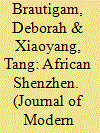

|
|
|
|
|
| Publication |
2011.
|
| Summary/Abstract |
This article examines recent Chinese efforts to construct a series of official economic cooperation zones in Africa. These zones are a central platform in China's announced strategy of engagement in Africa as 'mutual benefit'. We analyse the background, motives and implementation of the zones, and argue that they form a unique, experimental model of development cooperation in Africa: market-based decisions and investment by Chinese companies are combined with support and subsidies from an Asian 'developmental state'. Though this cooperation provides a promising new approach to sustainable industrialisation, we also identify serious political, economic and social challenges. Inadequate local learning and local participation could affect the ability of the zones to catalyse African industrialisation. The synergy between Chinese enterprises, the Chinese government and African governments has been evolving through practice. A case study of Egypt provides insight into this learning process.
|
|
|
|
|
|
|
|
|
|
|
|
|
|
|
|
| 2 |
ID:
114509


|
|
|
|
|
| Publication |
New Delhi, Penguin Books India Pvt. Ltd., 2011.
|
| Description |
xiii, 253p.Hbk
|
| Standard Number |
9780670085965
|
|
|
|
|
|
|
|
|
|
|
|
Copies: C:1/I:0,R:0,Q:0
Circulation
| Accession# | Call# | Current Location | Status | Policy | Location |
| 056747 | 813.52/DEB 056747 | Main | On Shelf | General | |
|
|
|
|
| 3 |
ID:
175184
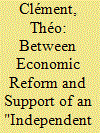

|
|
|
| 4 |
ID:
094680
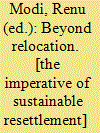

|
|
|
|
|
| Publication |
New Delhi, Sage Publications, 2009.
|
| Description |
xxx, 432p.
|
| Standard Number |
9788132100874
|
|
|
|
|
|
|
|
|
|
|
|
Copies: C:1/I:0,R:0,Q:0
Circulation
| Accession# | Call# | Current Location | Status | Policy | Location |
| 054856 | 333.3154/MOD 054856 | Main | On Shelf | General | |
|
|
|
|
| 5 |
ID:
147436


|
|
|
|
|
| Summary/Abstract |
The practice of development zones has expanded worldwide, yet scholarship persistently disagrees on the role that development zones play in local economic development. With its focus on China, this study contributes to the discussion by exploring the effects of development zones on the economic development of host regions, using both macro-level (all national-level development zones) and meso-level (county- and district-level development zones in Guangdong Province) analyses. Our data analyses of the macro-level reveal that development zones, even though positive in developed regions, do not contribute to economic growth in proportion to their share of land in host cities on the whole. The result is confirmed by the meso-level data analysis that indicates that county- and district-level development zones in Guangdong Province, a developed region in southern China, imposed positive effects on local economies. Therefore we suggest that the Chinese central government should not expand development zones without limits, but carefully consider their location and size in relation to the host regions before approving them.
|
|
|
|
|
|
|
|
|
|
|
|
|
|
|
|
| 6 |
ID:
113287
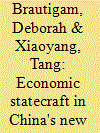

|
|
|
|
|
| Publication |
2012.
|
| Summary/Abstract |
China's rapidly growing economic engagement with other developing countries has aroused intense debates, but these debates have often generated more heat than light. The Chinese government is clearly pushing its companies to move offshore in greater numbers, and state-owned firms figure prominently in many of the major investments abroad. Yet relatively little research exists on when, how and why the Chinese government intervenes in the overseas economic activities of its firms. China's state-sponsored economic diplomacy in other developing countries could play three major strategic roles: strengthening resource security, enhancing political relationships and soft power, and boosting commercial opportunities for national firms. This article examines China's programme to establish overseas special economic zones as one tool of Beijing's economic statecraft. It traces the process by which they were established and implemented, and investigates the characteristics of the 19 zones initially selected in a competitive tender process. The article concludes that even in countries rich in natural resources, the overseas zones were overwhelmingly positioned as commercial projects. Particularly in the Asian zones, China is following in the footsteps of Japan. The zone programme, and the Chinese foreign investment it hoped to foster, represents a clear case of the international projection of China's developmental state. However, in Africa (but not generally elsewhere) discourse surrounding the zones publicly positions them as a transfer of China's own development success, thus potentially enhancing China's political relationships and soft power on the continent.
|
|
|
|
|
|
|
|
|
|
|
|
|
|
|
|
| 7 |
ID:
151437


|
|
|
|
|
| Summary/Abstract |
Since the coming to power of Kim Jong Un in 2012, the North Korean government has recently announced, and to some degree has implemented, a new set of economic management policies known as the June 28th measures in 2012 and the May 30th measures in 2014. Both of these sets of measures seek to build upon the abandoned reforms of the early 2000s through restructuring North Korea's highly inefficient collective farm and state-owned enterprise management system. In addition, the government has intensified ongoing efforts at building special economic zones for the purpose of attracting foreign investment. As such, the country is attempting to emulate the reforms adopted by China in the late 1970s. Although the success of these efforts is by no means guaranteed, they do serve to question mainstream analyses that suggest that Juche Self-Reliance or Sŏn'gun Military First Politics ideologies will inhibit any genuine attempt at economic reform in North Korea. We argue, in contrast, that ongoing changes to North Korean state and society mean that, a cyclical stop and start rhythm to the reforms notwithstanding, such attempts at economic reform are likely to continue. However, we also argue that while the contemporary reform drive resembles and may indeed reproduce some of the successes of the Chinese experience, North Korea faces significantly greater challenges, including the greater decline of North Korean industry, local resistance to reform, and the dangers of inflation. Furthermore, North Korea faces a highly challenging external security environment that undermines the ability of the regime to attract investment and by extension the political standing of reformist elements within the country. Given this contrast with the international environment surrounding China's own reform experience, our analysis emphasises the importance of geopolitical context in shaping experiences of economic reform and of development more broadly.
|
|
|
|
|
|
|
|
|
|
|
|
|
|
|
|
| 8 |
ID:
182718


|
|
|
|
|
| Summary/Abstract |
Do Special Economic Zones (SEZs) promote the productivity of producer services, and what are the channels of the effect? To shed light on these questions, we collect a dataset of 1.46 million producer service firms on the basis of the Second Economic Census of China. We then use the dataset to prove the productivity advantages of producer service industry in the SEZs. Guided by a “new” new economic geography model, we estimate these advantages using the IV model and unconditional distribution characteristic-parameter correspondence method. Results imply that agglomeration effect is the source of the productivity advantages of the producer services in the SEZs. This effect is positively correlated with the local manufacturing scale. A high industrial relevancy between the producer services and the leading manufacturing industry in the SEZs results in a strong agglomeration effect. The preferential policy in the SEZs reduces the entry barrier for firms and attracts a high proportion of inefficient firms entering with the selection effect. This result has a negative impact on promoting the productivity of producer services. The conclusions are robust in different circumstances.
|
|
|
|
|
|
|
|
|
|
|
|
|
|
|
|
| 9 |
ID:
081875


|
|
|
|
|
| Publication |
2008.
|
| Summary/Abstract |
The past year saw a dramatic surge of economic growth in India. Despite this rapid spurt of growth, significant political problems continue to hobble the country partially because the coalition government in New Delhi seems unable to make hard policy decisions. Consequently, it remains unclear if India can surmount many of the obstacles that still stand in the way of sustained economic growth and even increased international political stature
|
|
|
|
|
|
|
|
|
|
|
|
|
|
|
|
| 10 |
ID:
149553
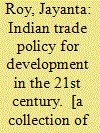

|
|
|
|
|
| Publication |
New Delhi, Ananta Aspen Centre, 2016.
|
| Description |
168p.hbk
|
| Standard Number |
9788193283509
|
|
|
|
|
|
|
|
|
|
|
|
Copies: C:1/I:0,R:0,Q:0
Circulation
| Accession# | Call# | Current Location | Status | Policy | Location |
| 058916 | 337.54/JOY 058916 | Main | On Shelf | General | |
|
|
|
|
| 11 |
ID:
112841


|
|
|
|
|
| Publication |
2012.
|
| Summary/Abstract |
After opening its doors to foreign trade and investment in 1978, China has become the largest recipient of inward foreign direct investment among developing and transition economies. The early policy of investment attraction, by means of fiscal incentives and special economic zones, has been relaxed now that many, though still not all, operating environment deficiencies have been effectively addressed and strong domestic enterprises have developed. While China remains the developing world's favourite investment destination, the government is adopting a more selective approach that may result in slower IFDI growth. The global crisis reduced FDI inflows to China, but this impact was lower than in many other FDI destinations, and flows have recovered considerably.
|
|
|
|
|
|
|
|
|
|
|
|
|
|
|
|
| 12 |
ID:
182951


|
|
|
|
|
| Summary/Abstract |
While China’s experience of using special economic zones (SEZs) for advancing economic development is a model increasingly adopted in other developing countries, the processes involved in replicating this model elsewhere and the outcomes of such replication remain little understood. This review article’s nested examination of three relevant strands of literature and two case studies of India and Ethiopia indicates that successful replication of China’s SEZ-led development would involve deliberate processes of adaptation from the original model. Replication must be “smart,” by taking into account the temporal, systemic, and other discrepancies between the Chinese model and the replicating country; replicating the benefits of China’s approach whilst avoiding the drawbacks; and maximising the positive effects of direct Chinese involvement and investments while reducing negative repercussions.
|
|
|
|
|
|
|
|
|
|
|
|
|
|
|
|
| 13 |
ID:
128535
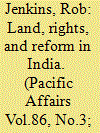

|
|
|
|
|
| Publication |
2013.
|
| Summary/Abstract |
India's legal regime governing the compulsory acquisition of private land by the state for "public purposes" - centered on the Land Acquisition Act 1894 (LAA) - has long been criticized for breeding corruption and insufficiently protecting landowners and local communities. Attempts to overhaul the LAA have faced stiff resistance from powerful interests within and outside the state. When the United Progressive Alliance government took power in 2004, few would have guessed that it would seek to replace the LAA with legislation that imposes more rigorous standards for the compulsory acquisition of land and detailed rules for rehabilitating displaced people. Yet, in 2011 the government introduced the Land Acquisition, Rehabilitation and Resettlement Bill (LARRB). This article argues (1) that the LARRB displays certain distinctive characteristics shared by other rights-related statutes enacted under the UPA government; (2) that the emergence of this distinctive - and unforeseen - piece of legislation was driven largely by India's approach to creating Special Economic Zones; and (3) that both the LARRB's content and the process by which it was introduced have implications for debates of wider theoretical significance, including the increasingly hybrid nature of rights, and the desirability of combining insights from the literatures on "policy feedback" and "policy entrepreneurs."
|
|
|
|
|
|
|
|
|
|
|
|
|
|
|
|
| 14 |
ID:
112518


|
|
|
|
|
| Publication |
2011.
|
| Summary/Abstract |
Vietnam and China have had along, if not always amicable, historical relationship. This relationship continued to be important even as Vietnam began its transition from a command economy to greater market orientation using the same strategy of pragmatic gradualism adopted by China when the latter began its own transition a decade before. As this strategy appears now to have lost momentum following the onset of the 2008 global financial crisis, Vietnam's economic planners, preparing the country's Socioeconomic Development Strategy for the new decade (2011-2020), have proposed new initiatives to achieve sustained growth. China's successful experiments, specifically with enterprise groups, special economic zones, and technology and industrial policies, again loom large among these proposed initiatives. To be successful, however, Vietnamese planners will need to be aware of the particular circumstances that favored China's experiments, to draw lessons from China's successes and failures, and to overcome the major challenges that Vietnam especially faces, These include, in comparison with China, a less competitive state enterprise sector; weaker implementation capacity at the subnational level, and pervasive corruption.
|
|
|
|
|
|
|
|
|
|
|
|
|
|
|
|
| 15 |
ID:
186630


|
|
|
|
|
| Summary/Abstract |
Discussions about state capacity and special economic zones (SEZs) arise in disparate academic circles, despite the fact that they both often address the relative level of state intervention in economic activity. Can the economic limitations of low state capacity be mitigated by the benefits of an SEZ? Drawing from interviews with non-governmental organization workers, bureaucrats and traders in the Gorno-Badakhshan Autonomous Oblast (GBAO) region of Tajikistan, this paper presents the case of the Tajik–Afghan cross-border free-trade markets as an example of a popular SEZ in a region marked by enduring diminished administrative state capacity. Highlighting the use of the administrative capacity of non-state actors, and its periodically contentious intersection with state coercive capacity, this paper illustrates the novel creation of SEZs to facilitate economic growth in contexts of enduring low administrative state capacity.
|
|
|
|
|
|
|
|
|
|
|
|
|
|
|
|
| 16 |
ID:
168786


|
|
|
|
|
| Summary/Abstract |
This study explores the relationship between special economic zones and regional integration in ASEAN countries, and identifies how to leverage the attributes of SEZs to deepen regional integration for regional development. The key argument is that SEZs can play a vital role in promoting regional integration if ASEAN member nations join hands to craft a visionary strategy.
|
|
|
|
|
|
|
|
|
|
|
|
|
|
|
|
| 17 |
ID:
165377


|
|
|
|
|
| Summary/Abstract |
Refugee response planners no longer frame Syrian refugees merely as objects of humanitarian care. Increasingly they are portrayed as enterprising subjects, whose formal integration into labor markets simultaneously can create self-sufficient actors and cure the economic woes of host countries. However, bringing together humanitarian and economic agendas is not an easy task. This article analyzes the contradictions and frictions that have emerged in the process of implementing the Jordan Compact, a political commitment to integrate Syrian refugees into the formal Jordanian labor market, and which is supposed to showcase such win-win strategies. It argues that the Jordan Compact should be seen as a policy model that has achieved enough consensus and incorporated enough disparate objectives to be labelled a ‘policy success.’ Yet, central actors have neglected core features of Jordan’s political economy and labor market, and/or the lives and survival strategies of refugees, such that their radical blueprints of transformation have been disrupted. Despite the widespread commitment to the scheme, it is thus unlikely that the Jordan Compact will both reinvigorate the Jordanian economy and offer Syrians the prospect of a dignified, self-sufficient life, an important lesson for comparable schemes being rolled out across the globe.
|
|
|
|
|
|
|
|
|
|
|
|
|
|
|
|
| 18 |
ID:
092262


|
|
|
|
|
| Publication |
2009.
|
| Summary/Abstract |
When China embarked on economic reform in the late 1970s, its leaders aspired to learn from Japan's developmental policies that were restrictive of foreign capital. In the 1990s, China strove again to emulate Japan and South Korea in restricting foreign direct investment and promoting indigenous corporations. Despite these efforts, China's industrial catch-up was in fact led by FDI, in sharp contrast to the classic Japanese/Korean paradigm where FDI was strictly circumvented. Why was China unsuccessful in learning restrictive FDI policies? How did a new developmental path emerge in China? The answer lies in China's strong networks with diaspora communities. Through a diffusion mechanism, ties between local governments and diaspora capital helped initiate and catalyze China's FDI liberalization, despite the central efforts to learn from Japan and South Korea. Two critical reform episodes are examined: (1) the establishment of special economic zones and (2) the reform of state-owned enterprises.
|
|
|
|
|
|
|
|
|
|
|
|
|
|
|
|
| 19 |
ID:
147624


|
|
|
|
|
| Summary/Abstract |
This paper examines whether cities with preferential policies have higher inequality in household disposable income per capita than cities without preferential policies in urban China. “Preferential policies” refers to the autonomy and deregulation given to Special Economic Zones (SEZs) and Open Cities, allowing them to experiment with market policies and reforms, as the country moves from a state-controlled economy towards a market-oriented economy. While the effect of these policies on economic growth is extensively documented, their relationship with income inequality remains undetermined. Subgroup decompositions of income inequality, using the China Household Income Project's urban datasets of over 6000 households and 20,000 individuals from of up to 70 cities from 12 provinces, were used to identify income inequality gaps between cities with and without preferential policies. The results reveal that while income inequality increased in urban China from 1988 to 2007, the change was lower for cities awarded preferential policies across regions. Furthermore, the decompositions by region indicate that cities receiving preferential policy treatment had higher income growth but a lesser increase in income inequality than cities without preferential policies in each region. Finally, cities receiving preferential policies were able to increase the share of income of the poorest 40% of households while reducing the share of the richest 10%.
|
|
|
|
|
|
|
|
|
|
|
|
|
|
|
|
| 20 |
ID:
116631


|
|
|
|
|
| Publication |
2012.
|
| Summary/Abstract |
The present study examines the ingredients of strategic state intervention in growth driven by special economic zones (SEZs). Analyzing the experiences of Taiwan, South Korea, and India, the research reveals that essential components of a strategic SEZ policy include the spirit of experimentation with strategic policy making informed by a medium- to long-term vision, as well as a strong commitment, pragmatic approach, dynamic learning, and institution-building.
|
|
|
|
|
|
|
|
|
|
|
|
|
|
|
|
|
|
|
|
|